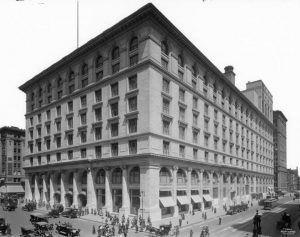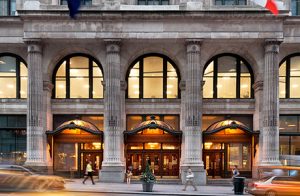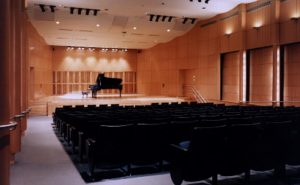New Yorkers aren’t known for being shy about what they like about their hometown (even if they’re originally from somewhere else). Sometimes, though, there’s just so much we can’t share it all. And I’m pretty typical in that way. Anyone who reads these posts knows how much fun I have with all the music available in the city, and while I’m not reticent about trying to share with all my friends, we can attend only so many operas, and ballets, and symphony concerts. So I’ll use this post to share some thoughts about one of my favorite music programs.

Days of Grandeur – 1920s or so
Before I get to the main topic, though, let’s give some attention to the splendid building it’s in. The program I want you to know about is Music in Midtown, sponsored by the City University of New York at the CUNY Graduate Center. Concerts are performed in one of Manhattan’s most revered structures, the former B. Altman Department Store, occupying the entire city block between Thirty-Fourth and Thirty-Fifth Streets from Fifth Avenue to Madison Avenue. The photo to the left shows the department store in its heyday, sometime in the 1920s or so. A family-owned business, the store came to be owned solely by one of the brothers, Benjamin Altman.
B. Altman (using his initial to give the store it famous and long-standing identification) built the Fifth Avenue building and opened it in 1906, but he died only seven years later. His stock was put into a foundation and his art collection went to the Metropolitan Museum of Art. Sadly, later toward the end of the 20th century and after not doing so well under various owners, Altman’s filed for bankruptcy protection in 1989, with the last of its stores closing in 1990.

CUNY Graduate Center
The photo to the right is my favorite image of this grand old artifact from another time. Even though it’s generally referred to as having been designed and built in the Italian Renaissance style – which, for the most part, it is – those great entrance canopies with all their curved glass certainly look like Art Nouveau to me! Altman’s Fifth Avenue building had been designated a New York City Landmark in 1985 and the building went unused until 1996. At that time, both the exterior and the interior were restored to be used by the CUNY Graduate Center (on the Fifth Avenue side) and on the Madison Avenue side of the building by the New York Public Library’s Science, Industry, and Business Library and Oxford University Press.
The series of programs I enjoy is called Music in Midtown, and it a super place to enjoy a fine selection of chamber music and other performances. These are lunchtime concerts focusing on the highly regarded musical performance program at the CUNY Graduate Center. The concerts are open to the public without charge and feature the talents of the music program’s renowned faculty, alumni, and outstanding performers selected from students. Some concerts are followed by a master class, which the public is invited to observe, and it’s all put together under the leadership of Norman Carey, the program’s Director and Jacqueline Martelle, Assistant Director. Professor John Musto, who has just been awarded a 2019 Arts and Letters Award in Music from the American Academy of Arts and Letters for his work as a composer, is the coordinator of the Graduate Center’s D.M.S. Program in Performance.

CUNY Graduate Center
Performances take place at the CUNY Graduate Center, in the Baisley Powell Elebash Recital Hall, and I have attended several of the midday programs. Each has been worthwhile, both rewarding to hear and thrilling for me as I learn about new performers and get to enjoy some of the very original programming put together for the programs. Recently I was able to attend a program called “Afternoons in Paris.” It caught my eye because I’ve always loved hearing about (well, mostly reading about) the musical community in Paris in the years between the two world wars. For composers – and I suppose for all artists – the time was a hotbed of enthusiastic knowledge sharing and conversation among so many performers, composers, lyricists, and everyone else who had an opinion and wanted to be heard.
Much interest of this period in music history seems to have centered around Nadia Boulanger and the many young people she encouraged, both as a teacher and as a composer (and who came to her weekly open houses to be with her and with one another). This concert re-created Boulanger’s composition studio in Paris and this particular Music in Midtown featured performers from Music from Copland House (MCH), the internationally-acclaimed touring ensemble-in-resident at Aaron Copland’s National Historic Landmark home in Westchester County (www.coplandhouse.org). They included MCH Founding Clarinetist and acclaimed composer Derek Bermel, MCH Founding Pianist and Copland House Artistic and Executive Director Michael Boriskin, MCH Principal Cellist Alexis Pia Gerlach, and MCH Principal Violinist Curtis Macomber. The group delighted the audience at the Elebash Recital Hall with Two Pieces for Violin and Piano by Aaron Copland (1926), Igor Stravinsky’s L’histoire du Soldat from 1918-19, and Gabriel Fauré’s Piano Trio in D Minor, Opus 120 from 1923.
Three more Music in Midtown performances are coming up:
April 4 Bilitis et Babar, with Paula Robison as Narrator: The program will present the ageless Histoire de Babar, le petit éléphant by Jean de Brunhoff with Francis Poulenc’s delightful music, Dialogue of the Young Ishmaelites from L’Enfance du Christ by Hector Berlioz, and the original version of Claude Debussy’s Bilitis, written for a staged presentation of Pierre Loüys’ sensuous and evocative poetry.
April 18 Chamber Music on Fifth II: Dolly Suite OP. 56 by Fauré, Quatres poèmes grecs, Op. 60 by Louis Vierne, and Schubert’s Piano Trio No. 2 in E-flat, Op. 100.
May 2 Chamber Music on Fifth III: Beethoven String Trio Op. 9, No. 3, Ravel’s Sonata for Violin and Cello, Sonata Op. 120 by Brahms, and Milhsud’s Suite for Clarinet, Violin, and Piano, Op. 157b.
Additionally, many student recitals are planned for the remaining months of the Spring term, and while I won’t attend them all, several look particularly attractive. These, too, are listed in the Music Spring 2019 Program Events Schedule.
Could there be a better way to honor the history of this wonderful old New York City landmark and the amazing talent on display at the Graduate center? What a splendid treat it is to have these outstanding artists perform for those of us in the neighborhood and the many who come from all other parts of the city as well!
Leave a Reply